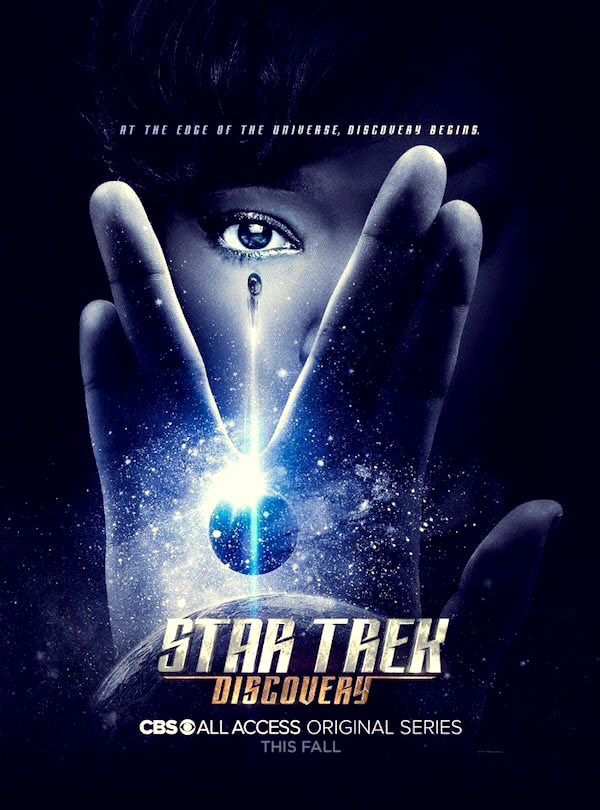Thoughts on Star Trek Discovery
This article will contain spoilers for the first four episodes of Star Trek Discovery. If you don't want to have the first four episodes of Star Trek Discovery spoiled, please, y'know, read something else for a while.
So. Star Trek Discovery.
A summary
It's good. It's enjoyable. It's entertaining. It's not a bad television show. I'm not sure that it's Star Trek, but it's fun.
What terrified me about the idea of a new Star Trek series is that there hasn't been a true Star Trek story for 13 years. The last proper Star Trek stories were told in the last few episodes of Enterprise, which concluded in 2005.
A "proper" Star Trek story is a story with a moral compass, a dilemma of conscience, a difficult human decision told through the peculiarities of an alien species or culture, and a resolution from which we all learn something and grow up a little bit more.
Since the end of Enterprise, there have been no Star Trek stories. There have been blockbuster action movies with Star Trek characters in them, but there have been no Star Trek stories.
(I lie -- there have been Star Trek stories, and they've been told by the talented and passionate fans and Trek alumni who have created fan series such as Star Trek: Continues and Star Trek: Phase II. Unfortunately, these stories are obviously not canon, but they filled a substantial and lengthy vacuum of quality Trek narratives.)
The story of Discovery, so far, is not a Trek story. Perhaps it may become one, who's to know at this stage. We've never experienced Star Trek in a long-form presentation, where episodes link constantly together and a growing story arc emerges. Perhaps the whole, rather than the parts, will be where the moral tale lies.
Starfleet is not an organisation of war
Starfleet is an organisation of peaceful exploration and scientific discoveries. It's not a military operation -- except when it is. There are two sides to war, and if the other guys want to fight you, you have little option whether to fight or back down. Starfleet is well equipped to fight a war, and given the need, will obviously do so in order to regain and maintain peace. That's how it works.
If anything, I find it interesting that in the Discovery timeline (for lack of a better description at this point), the war itself has resulted directly from the Federation's efforts at peaceful encounters.
The Klingons have changed (again)
Yep. They've changed. Again. They changed before, and we didn't care. Why do we care now?
I have no issue with the appearance of the "new" Klingons, nor the changes to Klingon culture. I just think the Klingons are a bit dull. This may be partly by design, perhaps it's partly the fault of the actors. I find they have little charisma.
The Klingon language, once rich in guttural grunts and coughs, seems now a repetitive barrage of equally spaced and monotonous syllabic sputters, with little to no emotion from the actors who seem focused entirely on remembering which phlegm noise comes next. T'Kuvma, the key Klingon in the pilot episode (or as I like to call him: "We couldn't afford Idris Elba"), speaks all of his lines in stanzas of three syllables, as if the actor could memorise the weird sounds only in triplets.
Also, the new Klingons have noses inside their noses. Just saying. Can't be unseen.
Breaking Gene's rules
Gene Roddenberry stipulated that in any of "his" Star Trek series, there would be no interpersonal conflict between Starfleet officers. By the 22nd century (or later), humans had achieved a kind of inner Zen, and no longer fought with each other -- only with aliens of differing cultures and moralities.
This is why, when Deep Space Nine was developed not long after Roddenberry's passing, the decision was made to team Starfleet characters up alongside Bajoran militia officers. If we can't fight amongst ourselves, lets force ourselves to get along with a war-like super-religious group of individuals, and let the conflict write itself. And it worked.
Since then, however, interpersonal conflict has gone crazy. And it's okay. Just because Gene made the universe of Star Trek doesn't mean that others can't come along and break the rules. It's okay. I promise.
Shifting gears to a competing franchise, don't forget that George Lucas made the Star Wars universe, including the prequels. If Disney and JJ Abrams hadn't broken George's established rules and made something new and exciting, we'd be stuck with green screens, awful acting from amazing actors, a duck-like creature with floppy ears, and "the high ground".
So, in short
Discovery is good. Star Trek is back on TV. It's a good time to be alive.

